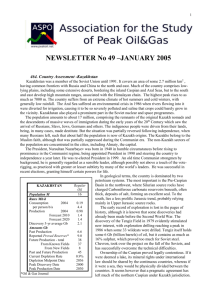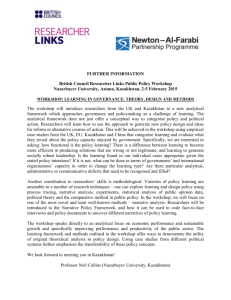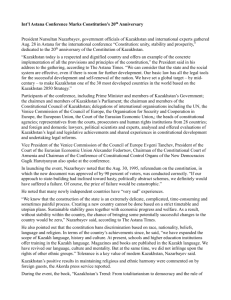Hey Position Specification Nazarbayev University Vice Provost
advertisement
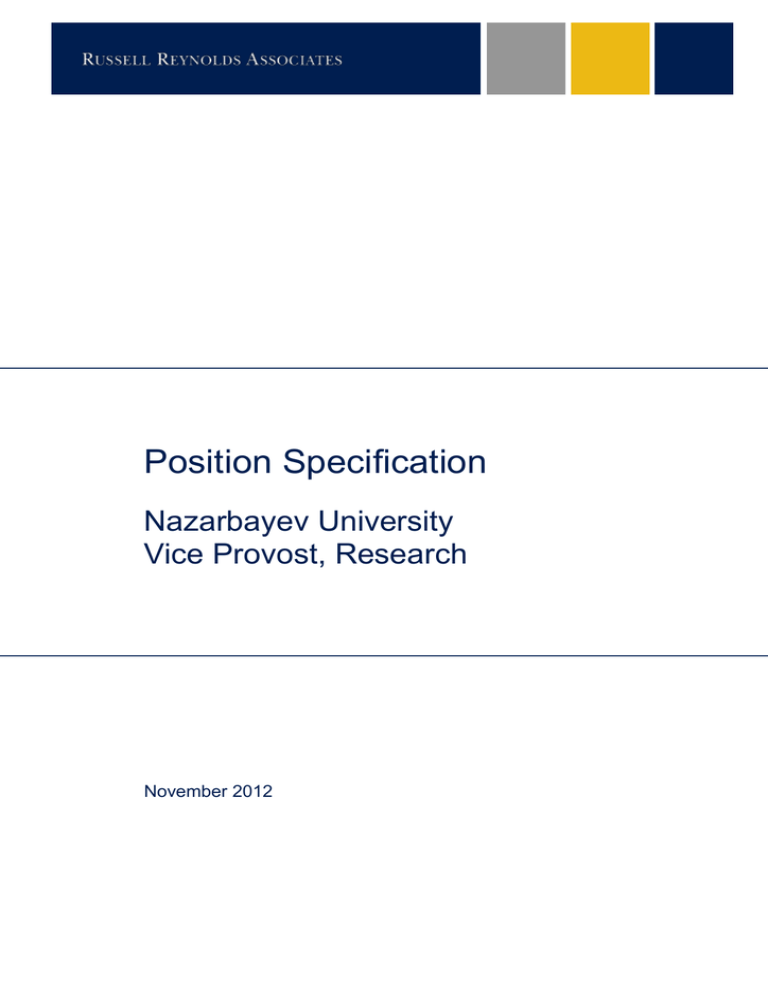
Hey Position Specification Nazarbayev University Vice Provost, Research November 2012 INTRODUCTION This specification should be read in conjunction with Nazarbayev University’s website: www.nu.edu.kz Nazarbayev University (NU) is a modern institution that borrows best practice from partners and higher education systems internationally, but retains a distinctive Kazakh identity. It has partnerships with leading universities in the US, UK and Singapore. With them, it is creating world-class schools and research centres. The first student cohort has passed through its foundation year and second year. The schools of Engineering, Science and Technology, and Humanities and Social Sciences received their first undergraduates on 29 August 2011. In September 2013, the Graduate School of Public Policy (GSPP) will be launched as one of the first Schools of NU to provide master degree programs. The University hopes to admit students to the Medical School in 2015. The University now seeks to appoint a Vice Provost of Research. Candidates will have an impressive research career in a STEM (science, technology, engineering and medicine) background and experience of leading research in a large faculty or across an institution. Importantly, these candidates will be citizens of the world, ideally with experience that extends beyond one university system, and a broad perspective on the dynamics of twenty-first century higher education. 1 NAZARBAYEV UNIVERSITY The Character of the University The University’s vision is to produce graduates prepared to the highest international standards to contribute to research, education, and the national economy. The NU mission is to advance the development of education and research in the Republic of Kazakhstan, as well as to contribute to Astana’s aspiration to become the research and educational centre of Eurasia. NU has been founded on the highest principles. It aspires both to realising the potential of the talented young people of Kazakhstan and to playing a leadership role as a teaching and research university, throughout and beyond the country. Autonomy and academic freedom are central to its purpose and all of its activities will be characterised by a commitment to excellence and integrity, both intellectual and ethical. To this end, the University will be a leader in innovation; it will pioneer new methods and approaches and a spirit of adventure will be central to its approach. The operations of the institution will be transparent and accountable and the University is committed under its University Law to collegial decision-making. NU will also be a pluralist institution, which is committed to fair and equal treatment of all its members, regardless of their ethnicity, religion, gender, nationality, social status or physical disability. Strategic Goals The strategic goals for NU are evolving. Currently, these are: Goal I: Educational reform leadership As NU develops it will ensure that lessons of experience are transferred and understood by other universities, schools and research centres. Goal II: Academic Excellence Achieving NU’s mission will depend critically on its success in developing and maintaining academic excellence. Goal III: Research Excellence NU will develop a programme of world-class research by partnering with the world’s best researchers and research institutions Goal IV: Healthcare reform leadership NU’s healthcare system will provide a model for healthcare reform throughout Kazakhstan. Goal V: Innovation and Production NU will be one of Kazakhstan’s main drivers of innovation, leading the way for Astana to become a regional hub of innovation. 2 Structure and Governance The High Board is the principal oversight body of NU and is chaired by the President. The Board of Trustees is chaired by the Prime Minister. The University Council is the chief executive body and includes the University Rector; Provost; VicePresidents, Deans of Schools; the Chair and Deputy Chair of the Senate, two Student representatives chosen by the Student Government. The Faculty Senate is a largely advisory body, whose function is to express the voice of the faculty to the administration. Please see the organisation chart in an Appendix to this document. Financial Position The University also has been building the first substantial endowment fund in the region. As governmental funding to cover the University’s costs is secure for at least five years the endowment will not be drawn on in that time. The University will also be seeking sponsorship of all kinds for such objects as research, faculty posts and student support. Academic Profile The University has established three undergraduate schools (faculties) and is establishing a number of graduate schools. Each school is being developed in collaboration with a major research-led university. Undergraduate schools offer Bachelor’s, Master’s and Doctoral programmes. Graduate Schools offer only Master’s and Doctoral programmes. The first post-graduate programmes will commence in 2013. UNDERGRADUATE PROGRAMMES The School of Natural Sciences and Technology has been established in collaboration with iCarnegie, a wholly-owned company of Carnegie-Mellon University. The School opened in 2011 with the teaching of Biological Sciences, Chemical Sciences, Physical Sciences, Mathematics, Computation, Robotics and Mechatronics and a Pre-Med Programme. The School of Social Sciences and Humanities has been established in collaboration with the University of Wisconsin-Madison. In the light of regional needs it will open with two sections, Humanities courses in History, World Languages and Literature and World Religions and Social Sciences courses in Economics, Political Sciences and International Relations, Sociology and Anthropology. It currently houses a non-degree programme in advanced Kazakh language which is a requirement for all Kazakh students. The School of Engineering has been established in collaboration with University College London (UCL). The School’s development has been informed by discussion with key industries and businesses in Kazakhstan, and with government ministries. The School’s aim is to ensure that its graduates are prepared to meet the growing demand in Kazakhstan for engineers who are able to think flexibly and to thrive in the ever-changing international business environment. 3 GRADUATE PROGRAMMES The Graduate School of Business is being established in partnership with the Fuqua School of Business at Duke University. The School as begun by offering an executive MBA programme and intends to offer a resident MBA programme. Executive education courses are already underway. The Graduate School of Public Policy is being developed with the support of the Lee Kuan Yew School of Public Policy at the National University of Singapore. Executive training for senior government officials has already begun, and a first cohort of Masters in Public Policy students will be admitted in summer 2013. The Graduate School of Education will have two strands, one focused on higher education in conjunction with the Graduate School of Education at the University of Pennsylvania, and the other concentrating on secondary education in partnership with the University of Cambridge. The school will open in 2013, initially with two Masters’ degree courses. The Graduate School of Medicine (SoM) is being developed in conjunction with the University of Pittsburgh and has six hospitals and a research centre already in place in time to open in 2015. The mission of the SoM is to create a new generation of physician-scientists to assume leadership positions in research, academia, and healthcare settings. This will be the first academic medical system in Kazakhstan, aiming to serve the tripartite mission of education, research, and delivery of health care. In its final state, NU Medicine will be an integrated healthcare enterprise, uniting physicians and scientists of the School of Medicine with the organizations, health professionals and facilities of the National Medical Holding and the Research Centre for Life Sciences. RESEARCH CENTRES One of NU’s priorities is to train world-class researchers. To this end, the university has established the following research centres: Center for Life Sciences Center for Energy Research Interdisciplinary Engineering Center Center for Educational Policy Research The goal is to attract top-level scientists regardless of nationality by offering the opportunity to conduct advanced research in cutting-edge facilities. At the heart of each centre will be an enabling research environment that encompasses basic research, technological application, coordinated programs, and consulting and analytical services in highpriority development fields. The Center for Life Sciences (CLS) operates in academic collaboration with University of Pittsburgh, and a number of other leading academic centres in the United States, Europe, South-East Asia. The goal of CLS’s research programs is to translate innovative biotechnologies into clinical practice and to help transform Astana into the regional healthcare leader and a global biotechnological centre. As a leading energy producer and exporter, Kazakhstan has a natural interest in energy-related research. The Center for Energy Research (CER) will explore energy and energy-saving technologies. The CER will focus on study, transfer and development of renewable energy, energy efficient 4 technologies, as well as will conduct applied and fundamental research in natural sciences, climate change & environmental studies, computer science and modelling, etc. The CER operates in academic collaboration with the Lawrence Berkeley National Laboratory and the Argonne National Laboratory. The Interdisciplinary Research Center will advance the scientific base in a range of cross-cutting fields and contribute to the development of Kazakhstan's engineering technology. Graduates and researchers at NU will be pioneers in their fields. They are the core of a new generation of researchers in Kazakhstan and the former Soviet Union who will spearhead efforts to contribute to science and technology in Kazakhstan and around the world. Strategic collaborations with academic centres in the United States and the other countries are crucial in achieving this goal. Further information about the early fruits of NU’s recent activity is found in an accompanying document. 5 THE ROLE The Vice Provost of Research will be a well-respected and internationally-experienced scholar with a distinguished research career in a STEM subject. S/he will be an engaged and persuasive communicator of NU’s strategy and will be a key player in the University’s achievement of its goals. The Vice Provost of Research will be responsible for the definition and delivery of the University’s research strategy and will provide inspiration and direction in all areas of research. Key to his/her success will be the ability to work across disciplines and ensure an approach that is fully integrated and prevents the creation of disciplinary silos. He or she will report to the newly appointed Provost, Simon Jones. The Vice Provost of Research will be responsible for a large and rapidly growing research budget. In 2012 the University invested c $25m in research projects and another $25m in research infrastructure. The anticipation is that this expenditure will double in 2013 (becoming the equivalent of 1% GDP of a growing economy). Whilst the University is well funded, the ambition is to create a world-class research and innovation hub that, in time, will attract international sources of finance. Additionally, it is expected that the commercialisation of research will become a further revenue stream and the Vice Provost must spearhead these efforts. Crucial to the role will be the ability to work effectively with experienced deans to encourage collaboration across and between schools and the research centres. Also vital is the ability to understand how to work successfully within a nascent university structure that is supported by respected international partners, but whose purpose will be guided by the will of the Kazakh people. This is an opportunity to create a research strategy, underpinned by significant institutional and financial support that will be instrumental in the intellectual and economic development of the region. 6 THE PROFILE Candidates should have a passion for academic excellence, demonstrated scholarly accomplishment, an established record of leadership in at a research university/institution higher education, and a keen understanding of research beyond their discipline, and the downstream exploitation of research. The successful candidate should have a strong commitment to international research excellence. The ideal candidate should also demonstrate impeccable ethics and integrity as a university leader and citizen. If so desired, the candidate will be encouraged to maintain their own research activities proportionate to the responsibilities of the post. Experience Candidates for the role will require: a strong record of research in a STEM discipline; experience of formulating and leading research policy across disciplines, either at a school/ faculty level or institution-wide; ideally, a record of having secured funding from international sources; ideally, some international experience involving more than one university system; ideally, experience in building institutions in a dynamic research environment; preferably a good knowledge of, or affinity with, Central Asia; a track record of building effective relationships to drive innovation and excellence in research and experience of the downstream exploitation of research; a track record of working in collaboration with policy and government institutions and administrative bodies at national and international levels. Personal Competencies Key skills will include: the energy to galvanise others; a commitment to the highest standards of international research; a warm and compelling communication style; a non-hierarchical approach and the ability to delegate responsibility appropriately; talent in managing both people and budgets; the determination to deliver success; 7 a collaborative leadership style and comfort working across disciplines, departments and organisations in a facilitative style. 8 HOW TO APPLY NU has appointed Russell Reynolds Associates to advise on this position. To apply, please send a full CV together with a supporting statement, briefly highlighting your experience and skills against the requirements of the role, to responses@russellreynolds.com. Please include the following job title and reference number in your e-mail, Nazarbayev University, Vice Provost, Research, 1210-044L. All applications will be acknowledged. For an informal discussion about the position, please contact a member of the Russell Reynolds team below. CONTACT Simon Kingston Russell Reynolds Associates Almack House 28 King Street London SW1Y 6QW United Kingdom Tel: +44 (20) 7830 8089 Fax: +44 (20) 7198 1850 Email:simon.kingston@russellreynolds.com Clare Gumbley Russell Reynolds Associates Almack House 28 King Street London SW1Y 6QW United Kingdom Tel: +44 (20) 7198 1876 Fax: +44 (20) 7198 1850 Email:clare.gumbley@russellreynolds.com Company Website: www.russellreynolds.com 9 For Budget 2013 Structure of the Autonomous Organization of Education “Nazarbayev University” (Total staff – 556) Secretariat of the Higher Board of Trustees-3 Higher Board of Trustees Approved № ______ « ___ » __________ 201_ Board of Trustees Committees Department of Internal Audit- 5 Vice-President for Medicine Executive Vice-President Rector (President) Secretary of the Board of Trustees Academic Council Provost Scientific Council Advisor-1 Security Service - 3 Department of Strategic Initiatives -7 Directorate of Tax and Accounting -9 Chief Financial Officer -1 Department of Finance and Risk Management -6 Department of Economic Planning and Analysis -6 Department of Investments and Asset Management -5 Managing Director for Staff and administration -1 Managing Director for Construction -1 Department of Procurement -6 PE «University Service Management » Corporate Fund «Social Development Fund» Medical School -3 Department of Integrated Academic Health System– 5 National Medical Holding PE «Center for Life Sciences» Vice-Provost for Academic Affairs Graduate School of Public Policy -20 School of Engineering -79 School of Humanities and Social Sciences -103 Center for Preparatory Studies 5 Office of the Rector (President) - 5 PE «NURIS» Office of the Provost 5 Graduate Admissions Department-6 JSC «Astana Knowledge City» Department of Academic Quality assurance - 5 PE «Graduate School of Education» Seconded from UCL to NU UPC Department of Communication and Marketing - 6 Department of Strategy and Coordination-5 Department of Human Resource Management -8 Student Career Development Center - 5 International Cooperation Department – 6 Department of Student Affairs-10 Sport center-3 Admissions Office-8 Department of Academic Budgeting -6 Registrar’s Office – 9 PE «Facility Construction Directorate» Vice-President for International and Student Affairs Vice-Provost for Research Graduate School of Business -19 School of Science and Technology -145 Secretariat of the Boart of Trustees - 3 Department of coordinating contracts with partners - 6 PE «Nazarbayev University Library and IT Services» JSC «National Analytical Cneter» Almaty Representative Office - 5 General Counsel Legal Department - 7 Department of Documentation Support - 7
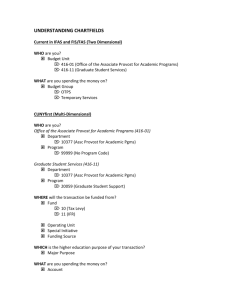
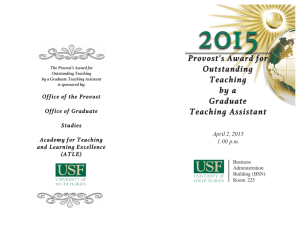
![Successful Universities - Home [ehelf.nu.edu.kz]](http://s2.studylib.net/store/data/005473189_1-c385f0ba098128b08458e724de79d96a-300x300.png)
